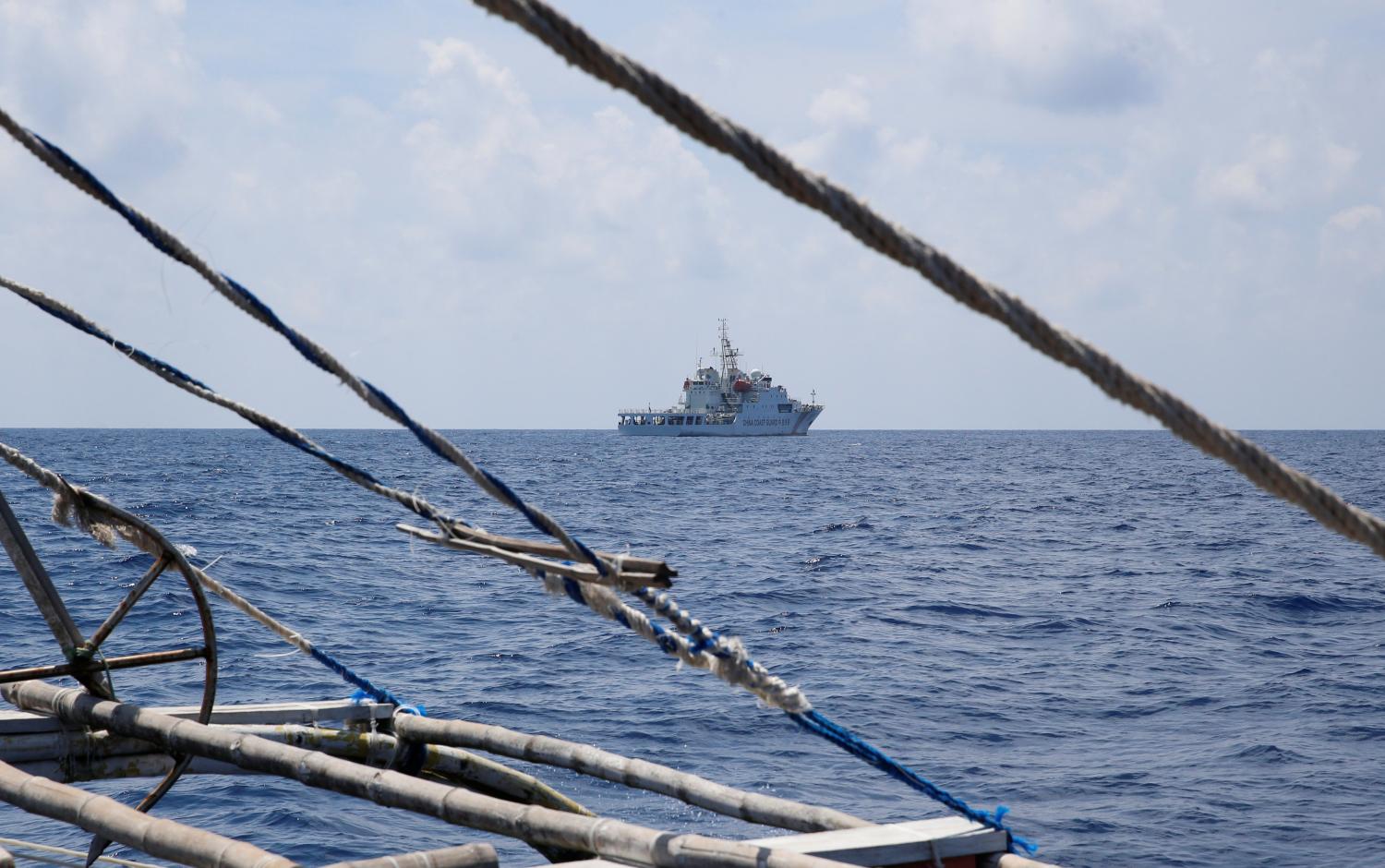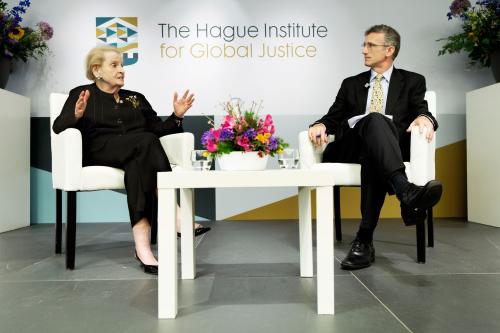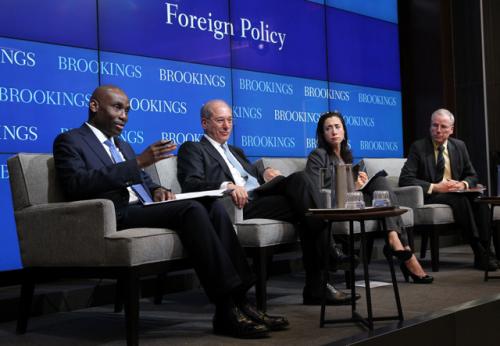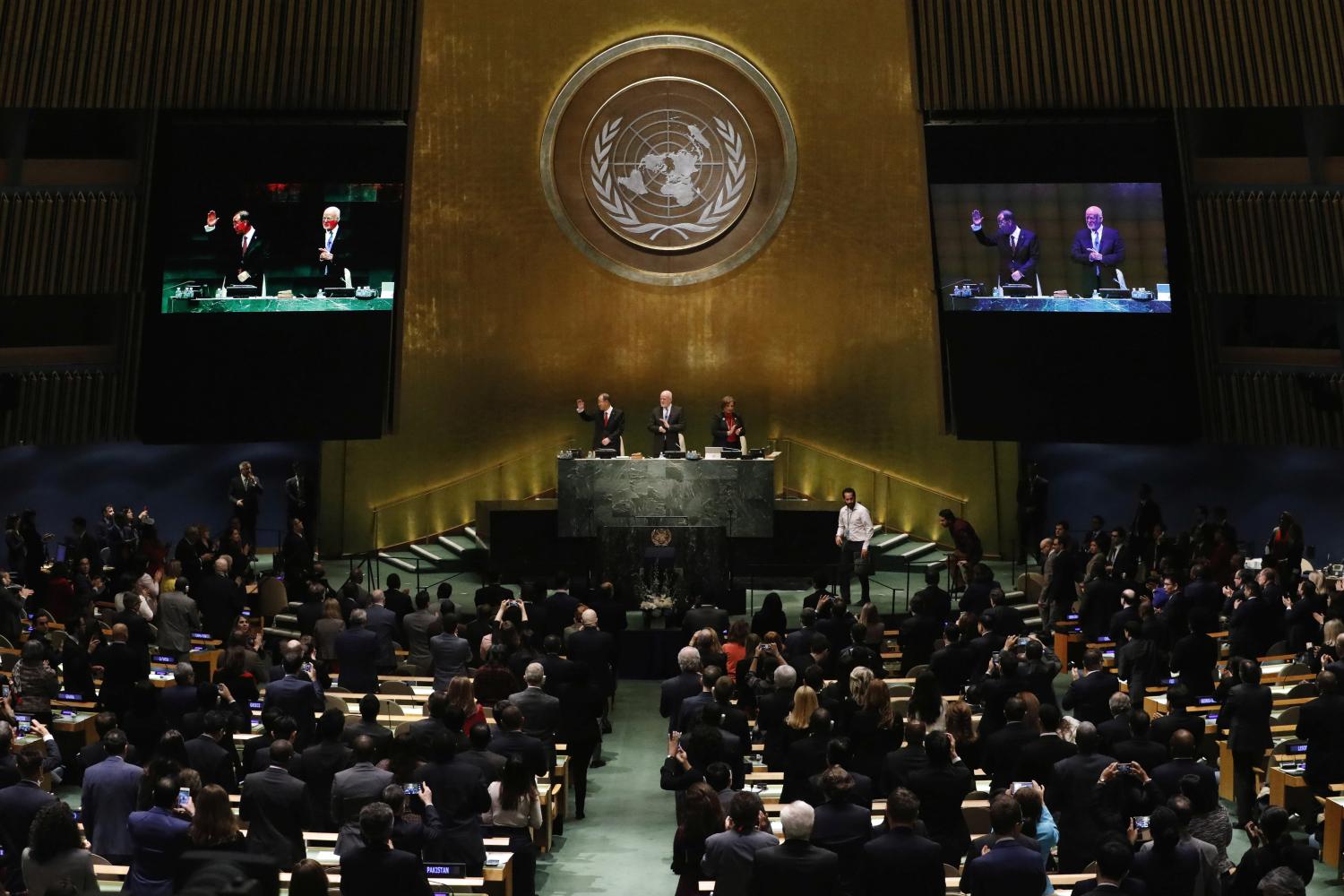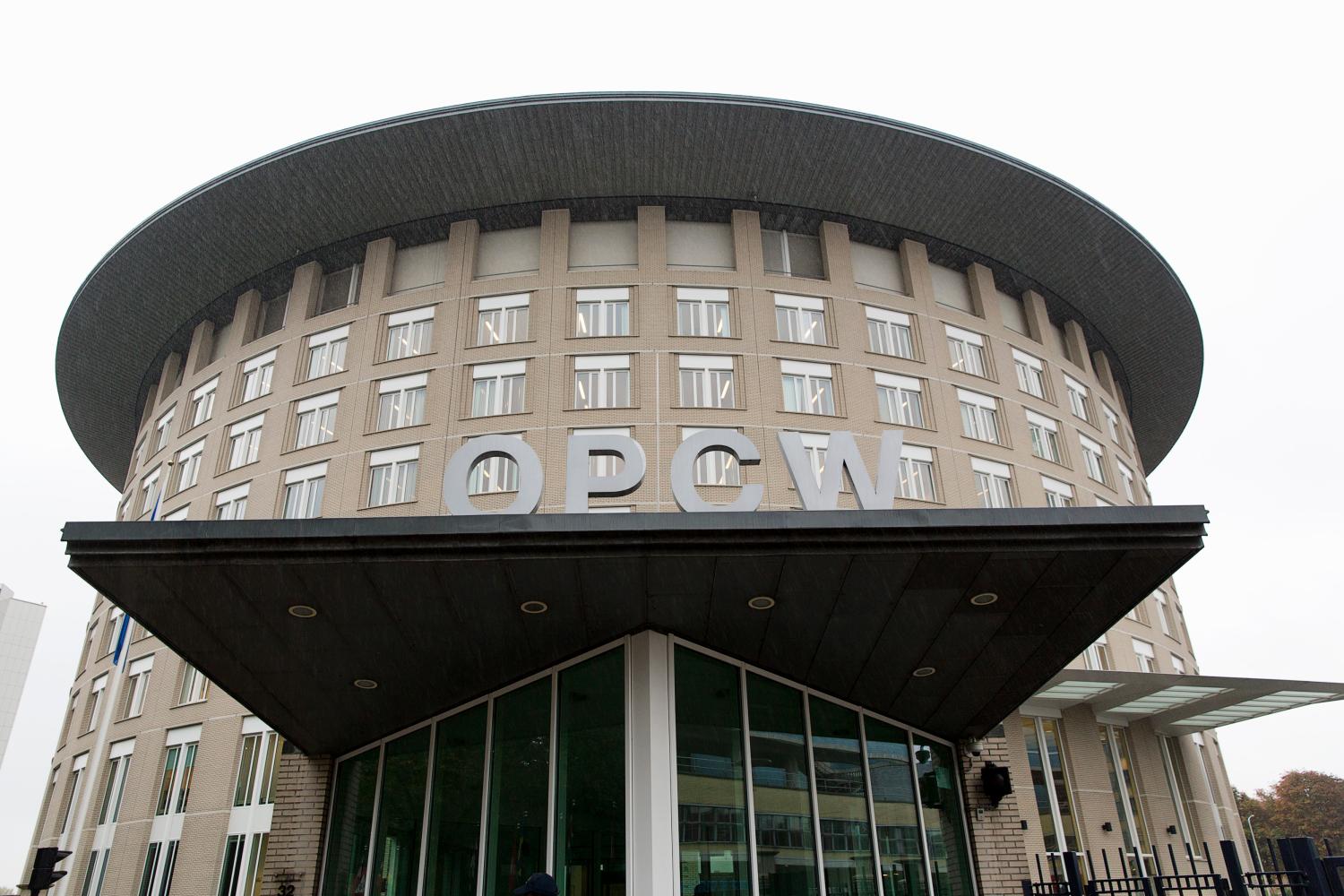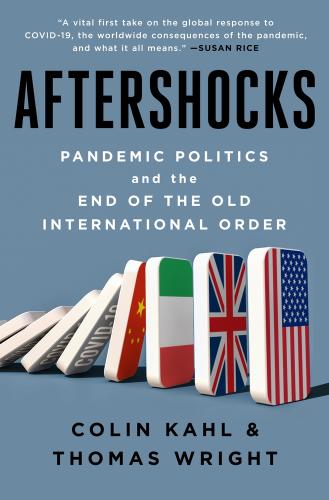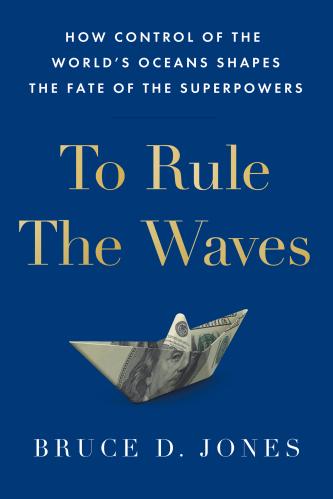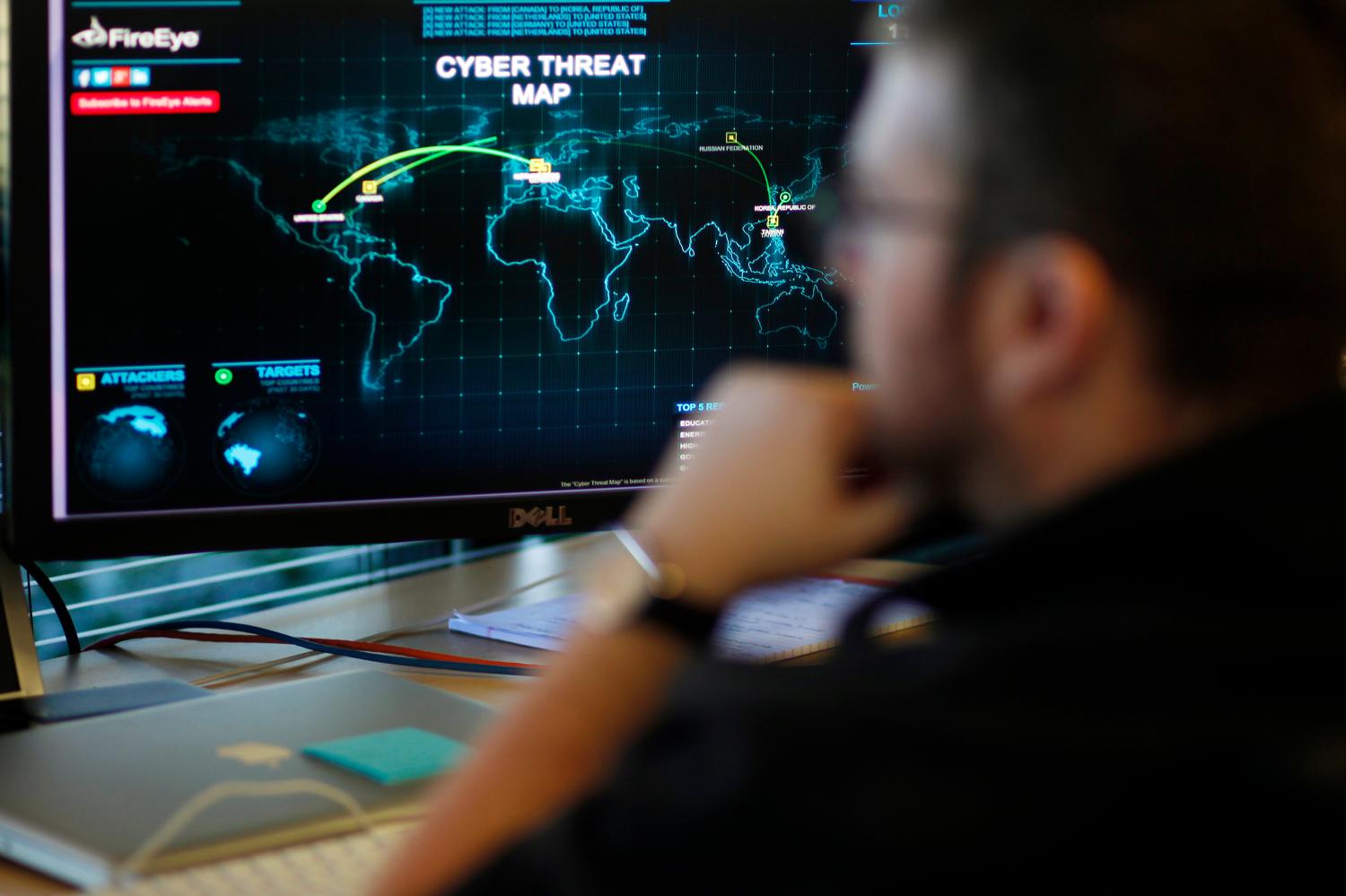The following essay is part of a publication series tied to the Justice Stephen Breyer Lectures on International Law, for which three distinguished speakers delivered remarks at Brookings. The full series is available here.
What does the law of nations mean in this new era of resurgent nationalism as narrowly defined by leaders like Donald Trump, Nigel Farage, and Vladimir Putin? To answer that question, it helps to return to some basic definitions and principles that remind us why nation-states have long found it in their interests to cooperate on matters of common concern. Laws based on norms of reciprocity, mutual respect, justice, and peace have regulated international relations since the times of ancient Greece. As trade across boundaries increased, it became increasingly in each state’s self-interest to define, and bind others, to common rules and customs, which extended to the oceans and seas as well.
Now, with over 560 major multilateral instruments deposited with the United Nations alone, citizens around the world benefit every day from rules their governments have adopted conjointly with each other. These agreements, as the American Society of International Law has documented, enable worldwide telecommunications and postal networks; universal recognition of time standards; improved weather forecasting; stronger safety standards for automobiles, airplanes, and ships; sharing of information about the origin of our food and other products; protection of software, literary, and artistic works; and preservation of cultural heritage sites and endangered species, to name a few.1 With the adoption of international human rights treaties after World War II, these rules expanded to protect people from torture and other forms of inhumane treatment; promote equal protection for women and children, including for adopted children and those caught in custody disputes; and facilitate pursuit of war criminals, terrorists, human smugglers, and drug traffickers. Agreements to protect the public and the environment from chlorofluorocarbons (CFCs) and other harmful pollutants are among some of the more effective binding instruments of modern international law.
[T]he political culture of the United States has turned markedly sour when it comes to ratifying treaties that demonstrably serve its national interests.
Despite these and many other obvious benefits from international law, the political culture of the United States has turned markedly sour when it comes to ratifying treaties that demonstrably serve its national interests. Two recent examples immediately come to mind: The U.N. Convention on the Rights of Persons with Disabilities, which is modeled on the Americans with Disabilities Act of 1990 and would protect disabled Americans when traveling overseas, was denied Senate ratification in 2012 based on spurious charges it would impinge on home schooling.2 Similarly, the U.N. Convention on the Law of the Sea, endorsed by senior U.S. military, defense, business, and environmental leaders as a key instrument for protecting U.S. interests in safe passage for its vessels and in its 200-nautical-mile exclusive economic zone, was blocked by 34 Republican senators in 2012 on grounds it would, inter alia, bind the United States to third party arbitration.3 Meanwhile, China and others are shaping the rules and practices of the treaty body that regulates exploitation of seabed resources without Washington having a seat at the table.
Such pro-sovereignty sentiments are now the dominant view in the White House and most of the Republican-controlled Congress. That is likely to spell further trouble for preserving U.S. leadership of an international order which has overwhelmingly served U.S. interests in a coherent system of rules and customs that has given us 70 years free of direct major power conflict and impressive economic prosperity.
The Justice Stephen Breyer Lecture series on international law, formally established in 2014 in partnership with the Netherlands Foreign Ministry, the mayor of The Hague, and The Hague Institute for Global Justice, was created to help policymakers on both sides of the Atlantic think about new challenges to international law and order. It would be fair to say that when our cooperation on this initiative began in 2013, we did not imagine that the pendulum swing against the underpinnings of the international order would advance as far and as fast as it has in the last year. Core beliefs and lessons learned from the 20th century are up for grabs around the world, including on both sides of the Atlantic, at least judging from current political discourse favoring nationalism over “globalism.” A trans-Atlantic approach, therefore, is particularly timely and relevant.
A trans-Atlantic perspective is also valuable as an intellectual endeavor because Europeans and Americans come from different historical perspectives, a point James Madison made in 1792: “The [U.S.] Constitution is a charter of power granted by liberty,” not, as in Europe, “a charter of liberty…granted by power.”4 The Declaration of Independence’s reference to “a decent respect to the opinions of mankind” was an early indication, however, that America’s founding fathers felt an obligation to consider the views of others, even its former colonial masters, in matters of law and justice. Justice Breyer, “the great transnationalist judge of our age,” has taken up that charge in the modern era, following in the tradition of Chief Justices John Marshall and John Jay.5
Since then, trans-Atlantic jurisprudence has largely converged around some fundamental principles based on national constitutions, the United Nations Charter, and institutions founded after World War II—“shared public norms with similar meanings in every national system of the world,” as Professor Harold Koh puts it. But meaningful differences remain and often revolve around the limits to which citizens and their representatives are prepared to cede traditional sovereignty to an international body. The European Union, for example, is wrestling mightily with both the benefits and costs of “pooled sovereignty.” While the United States may be a laggard when it comes to adopting certain treaties, it is not immune from the judicial and legislative decisions of other countries, as Justice Breyer himself explained so well in his inaugural lecture at Brookings. In a quickly changing world, he said, “we better learn what is going on elsewhere because that affects directly what we do at the Supreme Court. In a word, understanding and referring to what is happening abroad is often the best way to preserve our American values,”6 particularly our faith in the rule of law for ourselves and in our relations with others.
Justice Breyer’s analysis of five areas in which the development of law in other parts of the world has a direct effect on U.S. judicial decisionmaking includes matters highly relevant to public debates today, from protecting civil liberties from executive overreach to determining the application of World Trade Organization rules and decisions to U.S. domestic law. Under a Trump White House and Republican-controlled Congress clamoring to put America first, these issues are bound to be fiercely contested in the months ahead.
One area of international law that is not contested, at least not by the United States, is the strict prohibition against the production, stockpiling, and use of chemical weapons and their precursors, as set forth in the U.N. Chemical Weapons Convention (CWC).7 Ratified in 1997 by the U.S. Senate after intense debate, the CWC and its implementation arm, the Organization for the Prohibition of Chemical Weapons (OPCW), headquartered in The Hague, is the only legally binding instrument to ban comprehensively an entire class of weapons of mass destruction under international verification. More importantly, it has established a process in which the vast majority of states have declared their chemical weapons stockpiles for the purpose of their destruction under international monitoring. The United States and Russia, which hold the largest amount of such weapons, have committed to destroy their holdings completely by December 2020 and September 2023, respectively. The task of ridding the world of these reprehensible weapons will not be complete, however, until states outside the convention, like North Korea, are brought to heel. Even more challenging, as OPCW Director General Ahmet Üzümcü warned in his remarks at Brookings in April 2015, is stopping terrorists and other rogue actors from using chemical weapons to attack U.S. troops and innocent civilians, as seen in Iraq and Syria in 2016.8
In addition to the overwhelming international consensus to stop the use of chemical weapons, recent events in Syria have demonstrated the operational value of such binding commitments. After reports of chemical weapons attacks against Syrians were tragically confirmed in August 2013 when an estimated 1,500 people died from a sarin nerve gas attack in Ghouta, the treaty was quickly put to work. In short order, a U.N. investigation confirmed the use of chemical weapons, Syria submitted its instrument of accession to the CWC, and Russia and the United States agreed on a framework for the elimination of the Bashar Assad regime’s chemical weapons program. The OPCW then fast-tracked approval of a plan to eliminate the weapons, which the Security Council endorsed the same day.9 Three days later, OPCW experts were on the ground in Damascus to help verify Syria’s stockpile of approximately 1,300 metric tons of chemical weapons and oversee their destruction. As further elaborated by Director General Üzümcüin his speech at Brookings, a remarkable multilateral response involving contributions from 35 OPCW member states led ultimately to the removal and destruction of all of Syria’s declared chemical weapons by January 2016.
Unfortunately, the story does not end there. Reports of new attacks in Syria, this time with chlorine agents, emerged in 2015 and led to further U.N. investigations, spurring additional U.N. Security Council proposals by the United States and others to hold perpetrators accountable. This time, however, U.S.-Russia cooperation had evaporated, leading to a joint Russia-China veto of a U.N. Security Council resolution in February 2017 that would have imposed sanctions under Chapter VII of the U.N. Charter on Syrian government officials and entities linked to chemical weapons attacks; placed an embargo on arms sales and chemicals intended to be used as weapons; and established a mechanism to monitor implementation.10
The lessons learned from the Syria case about the realities of international law and politics are manifold: (1) establish clear rules of the road and mechanisms for implementation before a crisis hits; (2) move quickly on windows of opportunity when they arise; and (3) fortify the political will among major powers to ensure concrete action.11 The CWC worked well when all three factors were present, and fell short when the third element dried up. Consensus broke down in part because of the demand for punishment of specific government officials and agencies, a step apparently too far for Syria’s chief defenders on the Security Council. On balance, the CWC and its quick implementation in the Syria case certainly advanced U.S. national security interests in containing the spread of chemical weapons in a volatile part of the world. But the current lack of accountability for blatant violations raises serious questions about the deterrent value of the instrument.
While chemical weapons were prevalent over a century ago, new forms of warfare are emerging that test the boundaries of national and international laws rooted in core principles of necessity, proportionality, reciprocity, and human rights. The absence of specific rules that govern the use of new technologies like armed drones and offensive cyber weapons requires policymakers and lawyers, in Harold Koh’s view, to “translate what Montesquieu called ‘the spirit of the laws’ to present day situations,” at least until paralyzed legislatures are able to write new laws.12 Under the administration of President Obama, decisionmakers looked both to international and U.S. law for proper authority and guidance on how to engage in non-traditional armed conflict between a state and a transnational terrorist network like al-Qaida. These rules included humane treatment of combatants and noncombatants,13 as well as the strict prohibition of torture in all places and at all times with no exceptions.14 Targeted killings were considered permissible if in accordance with international humanitarian law (e.g., in situations of imminent threat, an act of self-defense, or an armed conflict where a combatant has no immunity), if the action was authorized under domestic and international law, and if the target’s rights have been considered and sovereignty of the relevant nation respected.
The need to clarify rules, and make them more formal, transparent, and subject to external oversight has never been greater.
The rules of engagement get murkier the further one moves away from traditional armed conflict. States, however, are slowly adopting voluntary guidelines as a step toward more binding norms. For example, the Montreux Document outlines a code of conduct for private security providers.15 The Tallinn Manual helps set standards for cyber conflict. But, as Harold Koh explained at his lecture at Brookings in 2016, much more work needs to be done to translate current laws to scenarios like humanitarian intervention in the absence of Security Council authorization, as in the case of Kosovo. The crime of aggression, which recently came into force as part of the Rome Statute, adds further complexity to situations where the international community must decide whether or not to address gross abuses, as in the case of Syria. The need to clarify rules, and make them more formal, transparent, and subject to external oversight has never been greater, even if the political will to deploy military force for such situations remains scant.
New forms of technology like robots, malware, and hacking raise difficult questions that remain pending on the international law agenda. The open and global nature of the internet has sparked an international revolution in the sharing of information, knowledge, and commerce for the benefit of humankind. It also raises, however, a number of thorny legal and ethical questions concerning malign uses of the web ranging from the theft of private data and pervasive cyberattacks to the dissemination of extremist views, lies, and propaganda.
The current political dynamic in the United States, and potentially in Europe, may push us away, however, from the longstanding principles and practices of international law and cooperation needed to do this vital work.
The collection of vast amounts of metadata for public and private purposes also poses a number of difficult issues regarding internationally recognized rights to privacy, information, expression, and association. Here, common ground between Europeans and Americans on the boundaries of privacy and control continues to be elusive. Confusion regarding the boundaries between “good” and “bad” uses of the worldwide web is growing as different national authorities intervene to regulate and mediate areas of digital-enabled conflict and competition with little to no normative consensus at the international level. Meanwhile, businesses are adopting their own measures to fill the yawning gaps in laws and regulations governing digital activities by setting limits on what to share with security agencies and establishing other self-policing mechanisms. Regardless, security loopholes are widening, ripe for exploitation by criminal forces.
The fourth annual Justice Stephen Breyer lecture on international law seeks to tackle these questions by convening top experts in the fields of technology, security, human rights, and law for a public discussion on how new technologies both advance and complicate international law and justice. The discussion will focus on two interrelated questions of technology and accountability: (1) what principles and protocols are needed for cross-border sharing of data for investigation and prosecution of crimes; and 2) what are the key technological tools and appropriate evidentiary standards for documentation and prosecution of violations of international humanitarian, human rights, and criminal law?
The world is changing very fast, and decisionmakers need help to untangle the complex tradeoffs between hard and soft law, policy guidance and political rhetoric, and good corporate practice and unbridled market capitalism. The current political dynamic in the United States, and potentially in Europe, may push us away, however, from the longstanding principles and practices of international law and cooperation needed to do this vital work. Justice Breyer, in his concluding remarks, powerfully warned of the dangers of a path away from the rule of law when he cited a passage from The Plague by Albert Camus, a metaphorical tale about the Nazis coming to France. Camus’s hero, Dr. Rieux, states that “the germ of the plague [that evil part of all mankind] never dies nor does it ever disappear.” Judges, says Justice Breyer, and the rule of law they and others fairly administer, cannot stop all the rats from spreading the plague, but they can be at least one weapon “in the war against that evil part of mankind.”
-
Footnotes
- American Society of International Law, “International Law: 100 Ways it Shapes our Lives” (Washington, DC: American Society of International Law, 2006), https://www.asil.org/sites/default/files/100%20Ways%20Booklet_2011.pdf.
- Ted Piccone, “Senate GOP failed on disability rights,” CNN, December 8, 2012, http://www.cnn.com/2012/12/08/opinion/piccone-senate-rights/.
- See, e.g., Matt Cover, “GOP Senators Sink Law of the Sea Treaty; ‘This Threat to Sovereignty,’” CNSNews.com, July 16, 2012, http://www.cnsnews.com/news/article/gop-senators-sink-law-sea-treaty-threat-sovereignty.
- James H. Read, Power versus Liberty: Madison, Hamilton, Wilson, and Jefferson (Charlottesville: University of Virginia Press, 2000), 29 (quoting James Madison writing in the National Gazette in 1792), cited in Stephen Breyer, “The Court in the world” (Washington, DC: Brookings Institution, 2017), 2.
- Harold Koh, “The emerging law of 21st century war” (Washington, DC: Brookings Institution, 2017), 1-2.
- Breyer, “The Court in the world,” 2.
- Organization for the Prohibition of Chemical Weapons, “Convention on the Prohibition of the Development, Production, Stockpiling and Use of Chemical Weapons and on their Destruction,” 1993, https://www.opcw.org/fileadmin/OPCW/CWC/CWC_en.pdf.
- Eric Schmitt, “ISIS Used Chemical Arms at Least 52 Times in Syria and Iraq, Report Says,” The New York Times, November 21, 2016, https://www.nytimes.com/2016/11/21/world/middleeast/isis-chemical-weapons-syria-iraq-mosul.html?_r=0.
- U.N. Security Council, Resolution 2118, “Middle East,” September 27, 2013, http://www.un.org/en/ga/search/view_doc.asp?symbol=S/RES/2118(2013).
- See statement by the Global Centre for the Responsibility to Protect, “UN Security Council Vetoes Undermine Accountability for Chemical Weapons Use in Syria,” February 28, 2017, http://www.globalr2p.org/publications/479.
- This is a modified version of the lessons learned set forth by Amb. Üzümcüin his 2015 lecture at Brookings.
- Koh, “The emerging law,” 3.
- See, e.g., National Defense Authorization Act for Fiscal Year 2016, Pub. L. No. 114-92, § 1045, 129 Stat. 726, 977; Marty Lederman, “The President’s NDAA signing statement re: GTMO and anti-torture provisions,” Just Security, November 25, 2015, https://www.justsecurity.org/27939/presidents-ndaa-signing-statement-re-gtmo-anti-torture-provisions/.
- Mary E. McLeod, “Acting Legal Adviser Mary McLeod: U.S. Affirms Torture is Prohibited at All Times in All Places,” U.S. Department of State,(opening statement before the U.N. Committee Against Torture, United Nations, Geneva, November 12, 2014), https://geneva.usmission.gov/2014/11/12/acting-legal-adviser-mcleod-u-s-affirms-torture-is-prohibited-at-all-times-in-all-places/.
- Switzerland Department of Foreign Affairs and the International Committee of the Red Cross, “The Montreux Document on Pertinent International Legal Obligations and Practices for States related to Operations of Private Military and Security Companies during Armed Conflict” (Berne: Switzerland Department of Foreign Affairs, 2008), https://www.icrc.org/eng/assets/files/other/icrc_002_0996.pdf.
The Brookings Institution is committed to quality, independence, and impact.
We are supported by a diverse array of funders. In line with our values and policies, each Brookings publication represents the sole views of its author(s).

